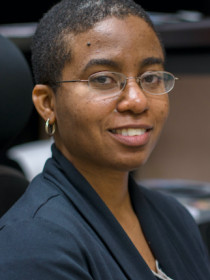
Keisha Lindsay
Connect with Keisha
About Keisha
Lindsay's research focuses on the relationship between race and gender in order to demonstrate how social groups' identities and differences affect the distribution of power. Lindsay pays particular attention to how black people articulate their gendered and racialized identifications via popular and scholarly conversations about a range of topics including public schools, gay marriage, black respectability, immigration, and policy brutality.
Contributions
How Assumptions about Race and Gender Skew School Reforms for Black Boys
In the News
Publications
Brings an intersectional framework to the academic and popular discourse about relations of power among African American men, African American women, and Black immigrants. Demonstrates that all three groups: 1) share an experience of gendered and ethnicized racism that situates them differently in the labor force, the classroom, and beyond and 2) can forge progressive coalitions if and when they recognize that what it means to experience gendered and ethnicized racism is the result of rather than the reason for their politics.
Details the complex politics of pro-all-black male schools discourse by situating the push to establish these schools within broader efforts at neoliberal education reform and within specific conversations about intersectionality's cooptation, "endangered" black males, and a "boy crisis" in education. Reveals 1) that intersectionality is anything but a necessarily feminist analytical framework and 2) that social groups' often discuss their experience of oppression in ways that both arise from patriarchal assumptions and foster anti-racist demands. Concludes by illuminating how educationally disadvantaged black people can build coalitions that challenge existing gendered as well as racial hierarchies of power.
Explores conservative black Christians' claims regarding their mutually constructing racial, religious, class, and sexual subordination to demonstrate that intersectionality can be used to advance a range of political arguments — including conservative ones. Rejects traditional understandings of intersectionality as a necessarily feminist analytical framework, as well as recent discussions that suggest that intersectionality's use for conservative ends is evidence of its theoretical underdevelopment.